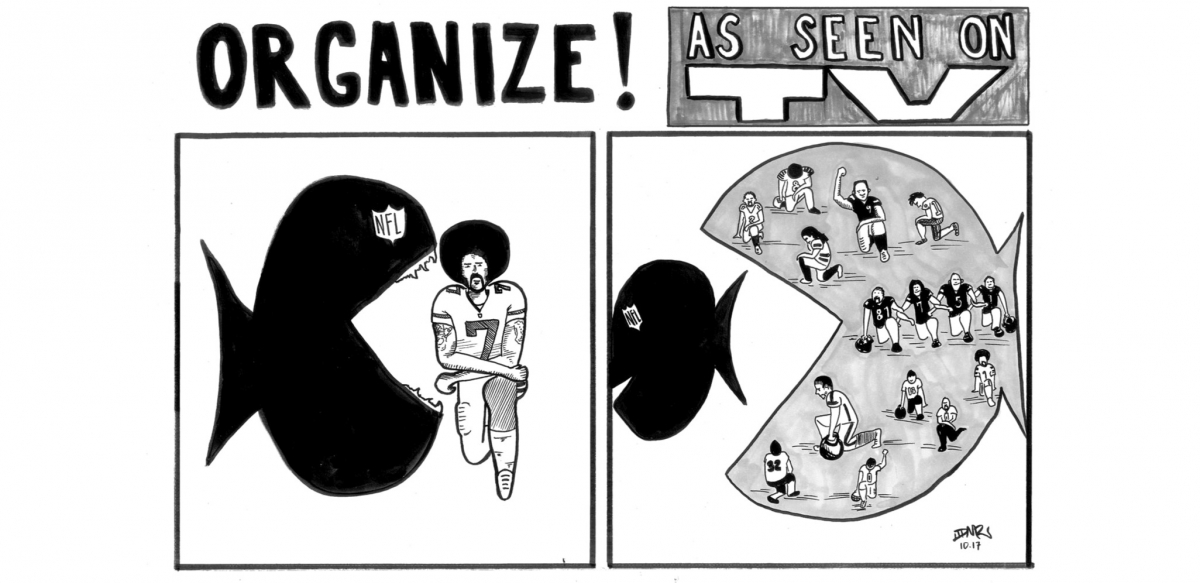Time for Labor to Up Our Game on Racism

The most important actions by union members this fall are happening on, of all places, the football field. Cartoon: Daniel Mendez Moore
The most important actions by union members this fall are happening on, of all places, the football field.
If other unions are smart, they'll take advantage of this moment. They'll use the fact that every single member knows about NFL players' protests for racial justice, and start conversations in their own locals.
Some might be tempted to shy away from this discussion, worrying it’ll divide us even further along racial or political lines, or that they’ll lose their seat in the next election.
And “right to work” can make union leaders even more conservative, afraid to provoke members who could quit the union.
But in the long run, keeping quiet doesn't promote the unity that unions need to challenge the boss or to take on Trump and his cascade of anti-worker appointees.
EVERYTHING IS HARD
“We’re the labor movement,” says AFL-CIO President Richard Trumka. “We can’t avoid a conversation on race and injustice and inequality because it’s hard… Everything we do is hard.”
These conversations, as you may have experienced, are already happening on the job. “Those water cooler conversations have now turned into conversations about race,” says C.J. Jenkins, a steward in a big mail processing facility in Baltimore and head of the local Coalition of Black Trade Unionists.
It’s our job to figure out how to bring this discussion into our unions, so that it happens in a way that strengthens our organizations. That doesn’t mean lecturing. Part of the work is just establishing a space for members to have honest, open—and difficult—conversations with one another.
THE SAGE DITKA

SUPPORT LABOR NOTES
BECOME A MONTHLY DONOR
Give $10 a month or more and get our "Fight the Boss, Build the Union" T-shirt.
A good starting point, suggests longtime labor activist Bill Fletcher, might be discussing Hall of Famer Mike Ditka’s point that, as he told an NFL radio host, “there’s been no oppression in the last 100 years.” (He later clarified that he was referring to the world of sports, which isn’t much better.)
“We have to take advantage of these moments,” says Fletcher. “Is oppression going on? Is it right to resist?
“I don’t know of many unions that are doing this,” he admits. “This goes back to November. The tremendous avoidable mistake by most of the union movement, of not having an open debate about endorsements [for President], led to a situation where once Trump won, many of these unions feel paralyzed, because they don’t know who their members are any more.
“So you have a situation where, instead of unions seizing on this moment, they’re trying to duck for cover.”
As a positive example, Fletcher holds up the Washington State AFL-CIO, which he’s been working with to develop a racial justice education program that other state feds could adopt. See page 8 for more examples of unions that are talking the hard talk.
But you might start on a smaller scale. Can you get some co-workers or activists from other unions together to talk, and brainstorm a strategy for jump-starting labor’s racial justice work in your area?
In your union, it may take one or two Colin Kaepernicks willing to stick their necks out and say to others, “We have to do something.”





